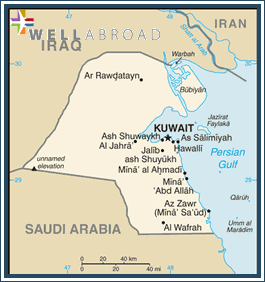|
MOST RECENT ALERTS
There's no recent alert.
|

|
|||||||||||||||
| COUNTRY OVERVIEW | ||||||||||||||||
|---|---|---|---|---|---|---|---|---|---|---|---|---|---|---|---|---|
|
| COUNTRY GENERAL INFORMATION | |||||||
|---|---|---|---|---|---|---|---|
| Language: |
Arabic (official), English widely spoken |
||||||
| Currency: | Kuwaiti Dinar (KD) | ||||||
| Predominant Religions: |
Muslim 85% (Sunni 70%, Shi'a 30%), Christian, Hindu, Parsi and other 15% |
||||||
| National Holidays: | National Day, 25 February (1950) | ||||||
| Economic Status: |
Kuwait is a small, oil-rich constitutional monarchy with 10% of proven world oil reserves. Foreign workers constitute approximately 80% of the labor force. Kuwaiti citizens constitute only 34% of the country's population of 2.9 million, and enjoy the benefits of a generous social welfare system that guarantees employment, housing, education and medical care. |
||||||
| Security: |
Land Forces, Kuwaiti Air Force (Al-Quwwat al-Jawwiya al-Kuwaitiya), National Guard |
||||||
| US Presence: | |||||||
| Document Requirements: |
Passports and visas are required for U.S. citizens traveling to Kuwait. U.S. citizens can obtain visitor visas for a fee at the port of entry in Kuwait. Travelers who overstay their visas may be required to pay large fines before leaving Kuwait. Travelers who leave Kuwait without completing Kuwaiti exit procedures may also be required to pay large fines if they return to and attempt to depart from Kuwait. This includes travelers proceeding via Kuwait to and from Iraq and Afghanistan. Effective May 15, 2007, the Government of Kuwait no longer admits travelers with a contractor identification card. All contractors entering or transiting the State of Kuwait should have a valid passport. Visas can be obtained upon arrival in Kuwait for a fee of 3 Kuwaiti Dinar (KD). For further information on entry and exit requirements, travelers may contact the Embassy of Kuwait at 2940 Tilden Street NW, Washington, DC 20008, telephone (202) 966-0702, or the Kuwaiti Consulate in New York City, telephone (212) 973-4318. Kuwaiti officials are extremely sensitive about travel to Iraq. There have been instances in which Americans, especially those of Iraqi descent, have been detained for questioning at ports of entry/exit. Americans seeking to travel to Iraq through Kuwait have also on occasion been turned around and/or detained. On a number of occasions the border between Iraq and Kuwait has been closed without notice, stranding Americans on either side of the border. Kuwaitis and non-Kuwaitis, including Americans, who have been charged with criminal offenses, placed under investigation, or involved in unresolved financial disputes with local business partners are subject to travel bans. These bans, which are rigidly enforced, prevent the individual from leaving Kuwait for any reason until the matter is resolved. Travel bans can be initiated by any person for almost any reason and may remain in place for a substantial period of time while the case is being investigated. Expatriates have been detained in Kuwait for cases with seemingly little or no evidence or legal merit. A person who has influence with the Kuwaiti government can ensure that a travel ban remains in place even if a judge or government official states the ban should be lifted. In the case of purely financial disputes, it may be possible to depart the country if a local sponsor pledges funds equal to the amount in dispute. Once such legal orders are in place, the U.S. Embassy can assist American citizens in obtaining legal representation, but cannot overcome the ban on exit from the country until the matter is resolved. Information about dual nationality or the prevention of international child abduction can be found on our web site. For further information about customs regulations, please read our Customs Information sheet. |
||||||
| Major Airports: |
Airports: 7, Airports w/paved runways: 4 |
||||||
| Servicing Airlines: |
|
||||||
| Risks and Precautions: |
Americans in Kuwait should exercise a high level of security awareness. The Department of State remains concerned about the possibility of further terrorist actions against US citizens and interests abroad, specifically in the Middle East, including the Persian Gulf and Arabian Peninsula. All US citizens in Kuwait should exercise caution, maintain a low profile, and avoid areas where Westerners are known to congregate. US citizens are advised to immediately report any unusual or suspicious activity in Kuwait to the Kuwaiti police or to the U.S. Embassy. The crime threat in Kuwait is assessed as low. Violent crimes against expatriates are rare, but do occur. The US Embassy advises all US citizens to take the same security precautions in Kuwait that one would practice in the US or any other large city abroad. Physical and verbal harassment of women are continuing problems. |
||||||
| Mortality Statistics: |
Infant MR total: 9.71 deaths/1,000 live births Life expectancy at birth: TOTAL 77.2 years (male 76.13/female 78.31) |
||||||
| Immunization Indicators: |
Required: None
Recommended: Hep A & B, Rabies, Typhoid |
||||||
| Infectious Disease Concerns: |
Cutaneous leishmaniasis is reported throughout the area. |
||||||
| Overall Quality of Medical Services: |
The health care system continues to develop, with many government and private medical facilities available in Kuwait. Medical care at government-run clinics and hospitals is provided at low cost to residents of Kuwait. Private physicians and hospitals charge fees for services, and some do not accept local health insurance. Many hospital and clinic services do not compare to U.S. standards, and staffs often have no U.S. experience or training. |
||||||
| Providers in Network: |
|
||||||
| Recent Medical Threats/ Concerns/Warnings: |
A rise in West Nile fever has been seen recently in Israel. Outbreaks of dengue occurred in Saudi Arabia and Yemen in 2002. Protecting yourself against insect bites (see below) will help to prevent these diseases. |
||||||
| Communications Info: |
Country Calling Code: +965 Internet Country Code: .kw |
||||||






